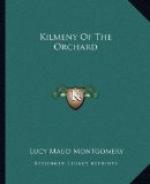All the way home, over fields and pastures that were beginning to be moonlight silvered he pondered the mystery.
“Let me see,” he reflected. “Mr. Williamson was describing the Lindsay girls for my benefit the other evening. If I remember rightly he said that there were four handsome ones in the district. What were their names? Florrie Woods, Melissa Foster—no, Melissa Palmer—Emma Scott, and Jennie May Ferguson. Can she be one of them? No, it is a flagrant waste of time and gray matter supposing it. That girl couldn’t be a Florrie or a Melissa or an Emma, while Jennie May is completely out of the question. Well, there is some bewitchment in the affair. Of that I’m convinced. So I’d better forget all about it.”
But Eric found that it was impossible to forget all about it. The more he tried to forget, the more keenly and insistently he remembered. The girl’s exquisite face haunted him and the mystery of her tantalized him.
True, he knew that, in all likelihood, he might easily solve the problem by asking the Williamsons about her. But somehow, to his own surprise, he found that he shrank from doing this. He felt that it was impossible to ask Robert Williamson and probably have the girl’s name overflowed in a stream of petty gossip concerning her and all her antecedents and collaterals to the third and fourth generation. If he had to ask any one it should be Mrs. Williamson; but he meant to find out the secret for himself if it were at all possible.
He had planned to go to the harbour the next evening. One of the lobstermen had promised to take him out cod-fishing. But instead he wandered southwest over the fields again.
He found the orchard easily—he had half expected not to find it. It was still the same fragrant, grassy, wind-haunted spot. But it had no occupant and the violin bow was gone from the old bench.
“Perhaps she tiptoed back here for it by the light o’ the moon,” thought Eric, pleasing his fancy by the vision of a lithe, girlish figure stealing with a beating heart through mingled shadow and moonshine. “I wonder if she will possibly come this evening, or if I have frightened her away for ever. I’ll hide me behind this spruce copse and wait.”
Eric waited until dark, but no music sounded through the orchard and no one came to it. The keenness of his disappointment surprised him, nay more, it vexed him. What nonsense to be so worked up because a little girl he had seen for five minutes failed to appear! Where was his common sense, his “gumption,” as old Robert Williamson would have said? Naturally a man liked to look at a pretty face. But was that any reason why he should feel as if life were flat, stale, and unprofitable simply because he could not look at it? He called himself a fool and went home in a petulant mood. Arriving there, he plunged fiercely into solving algebraical equations and working out geometry exercises, determined to put out of his head forthwith all vain imaginings of an enchanted orchard, white in the moonshine, with lilts of elfin music echoing down its long arcades.




